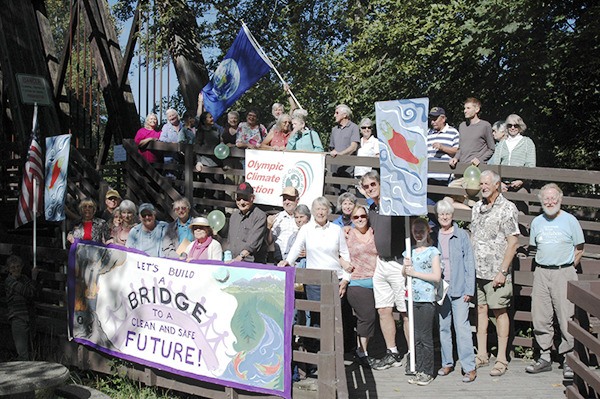Climate presentation
When: 2 p.m., Wednesday, Jan. 14.
Where: Dungeness River Audubon Center, 2151 W. Hendrickson Road
More info: olyclimate.org or visit www.noprcd.org
To inform and instill a sense awareness on climate change and the possible local impacts, Cindy Jayne, project manager for North Olympic Peninsula Resource Conservation and Development, and longtime climate change educator and member of Olympic Climate Action, Bob Lynette, are teaming up to make a public presentation at 2 p.m., Wednesday, Jan. 14, at the Dungeness River Audubon Center.
Hosted by the Dungeness River Management Team, Jayne will kick off the presentation with an explanation of the Climate Adaptation Grant and locally led climate action occurring in both Clallam and Jefferson counties.
Lynette will follow Jayne’s presentation by taking a more macro look at a couple of climate-centric topics anticipated to surface during the state’s legislative session spanning Monday to April 27.
The grant
Using a $152,078 grant from Washington Departments of Commerce and Ecology, North Olympic Peninsula Resource Conservation and Development officials and project partners have been pursuing the creation of a Climate Preparedness Plan for the North Olympic Peninsula since June.
While summarizing past work and looking ahead on the project’s timeline, Jayne will inform the audience of the grant-funded plan expected to provide information for informed future planning and assist in both identifying and providing a better understanding of local vulnerabilities and risks associated with climate change.
“In general, the presentation is intended to provide an overview of what’s going on,” Jayne said.
Given the nature of the topic, the Climate Preparedness Plan likely will continue to evolve as research emerges, Jayne said, but once drafted the plan will be presented to municipalities, including county and city planning commissions, planners, watershed planning organizations and other groups to inform their decision-making with specific local information and strategies to reduce the risks.
“We really want to be able to inform officials and their decision making,” she said.
Although the grant draws to a close in October, ongoing monitoring of the implementation of solutions and actions recommended in the Climate Preparedness Plan will continue through the work of volunteer groups.
“We’ll be looking for opportunities to put the plan into action,” Jayne said. “Climate change is already happening, but the more we can do to understand it as a community, the more likely we can minimize the impacts overall.”
State action
“I’ll mostly be talking about Gov. Jay Inslee’s Carbon Pollution Accountability Act and Clean Fuels Initiative,” Lynette said. “I will try to do this in 20 minutes.”
Among the many ideas to be discussed at the state level, the possibility of a “cap and trade system” for better managing greenhouse gas pollution is among them, Lynette said. The Carbon Pollution Accountability Act proposed by Inslee would limit the amount of carbon dioxide and/or equivalent pollutants a company or source could emit. The amount of greenhouse gases would be limited by state-issued certificates.
Over time, Lynette said, the act also would decrease the overall total amount of greenhouse gases allowed within Washington in an attempt to meet statutory greenhouse gas limits adopted by the state Legislature in 2008.
“The carrot at the end of the stick is it (Carbon Pollution Accountability Act) would generate an estimated $1 billion per year for the state and also provide incentive for greater energy efficiency,” Lynette said.
Secondly, Lynette will introduce the proposed Clean Fuel Standard, which is part of a larger strategy to decrease carbon emissions proposed by Inslee with the guidance of his Carbon Emissions Reduction Task Force.
“The greatest percentage of carbon emissions comes from cars, trucks and other transportation sources, contributing nearly half of the state’s total carbon emissions,” according to Inslee’s policy brief on Dec. 17. “Washington has three strategies to decrease carbon pollution from transportation: cleaner cars, cleaner fuels and moving people and goods more efficiently.”
The Clean Fuel Standard would require over time fuel suppliers to increase the mixture of other properties, such as ethanol to fuel while encouraging the use of electric cars and biofuels, Lynette said.
Lastly, Lynette will briefly summarize the efforts of a grassroots group, Carbon Washington, and its statewide campaign to bring about revenue-neutral carbon tax.


